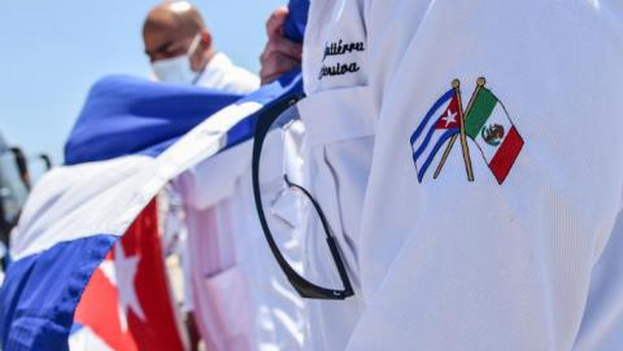
![]() 14ymedio, Madrid, 4 January 2022 — “Internationalism is a principle that has characterized Public Health in Cuba since the beginning of the first Cuban medical collaboration, in 1963, in Algeria,” the Cuban Foreign Ministry said on Tuesday on its Twitter account. The Ministry of Foreign Affairs left a significant fact about it yesterday, much celebrated this Wednesday by the official press: “At the moment, 23,792 Cuban collaborators work in 56 countries.”
14ymedio, Madrid, 4 January 2022 — “Internationalism is a principle that has characterized Public Health in Cuba since the beginning of the first Cuban medical collaboration, in 1963, in Algeria,” the Cuban Foreign Ministry said on Tuesday on its Twitter account. The Ministry of Foreign Affairs left a significant fact about it yesterday, much celebrated this Wednesday by the official press: “At the moment, 23,792 Cuban collaborators work in 56 countries.”
The figure, which has given such good economic returns to the coffers of the Cuban State, has only diminished in recent years. In the last 12 months, the fall has been pronounced, as in 2021 it was announced that 30,407 health workers were placed abroad, specifically to 66 countries. A year earlier, during the outbreak of the pandemic, the figure was somewhat lower, with 28,000 doctors present in 58 nations.
The data were similar in the previous two years, although the presence was more global, with more than 30,000 doctors in 2019 and about 28,000 in 2018 in up to 67 countries. However, in 2015, 2016 and 2017, the volume of health professionals serving abroad (62 and 67 countries, depending on the year) was spectacular and double the current one, with more than 50,000 people.
Accordingly, the State’s accounts are suffering. According to official data, collected in the statistical yearbooks published by the National Office of Statistics and Information (ONEI), 4.349 billion dollars were received in 2021 for the export of health services abroad, and a year earlier it was 3.997 billion compared to 5.382 billion in 2019 and 6.300 billion in 2018.
In 2017, the year that marks a before and after, 9.628 billion dollars were received. The figure is an average, since, according to the official press, in 2014 about 8 billion convertible pesos (CUC) were obtained from abroad, a figure that according to former Minister of Economy José Luis Rodríguez could amount to an average of 11.543 billion dollars between 2011 and 2015, which reflects the progressive decrease.
It is difficult to confirm exactly the number of professionals who leave each year and, of them, how many do so as part of the international agreements that the Island maintains with other countries, and how many are in the contingent of doctors specialized in disaster situations and serious epidemics, known as the Henry Reeve Brigade.
In the first case, the program has been running for 59 years in which, according to the authorities, more than 2 billion patients have been treated in 165 countries. In the second, the brigades began in 2005, and 13,467 professionals have been part of them, deployed by 55 nations in which emergency reinforcements were needed. In that group there would be those displaced by earthquakes or epidemics such as Ebola between 2014 and 2016, and, more recently, COVID-19.
Due to the pandemic, Cuban doctors were in more than 40 countries, some of them never visited before, such as Italy and Andorra.
The reputation of Cuban doctors in international missions has degraded to the same level as their income and staff. The wave of right-wing governments throughout Latin America after Donald Trump was elected US President only increased the damage to the official business. In a few years, billion-dollar contracts were broken with Bolivia, Ecuador and, in particular, with Brazil.
At the same time, what was previously an open secret on the Island began to be known: the exploitation of the healthcare workers. Doctors, nurses and other staff sent abroad receive a high salary in the context of the Island — an incentive that has maintained its value since the private sector began to put larger salaries in the pockets of many Cubans than the state — but they barely keep 15-20% of what the receiving governments allocate for each of them. The rest goes to the state coffers.
In addition, doctors have revealed on numerous occasions how they are prevented from relating to the native population of the countries where they are placed, how they are urged to create propaganda on social networks while being prevented from demonstrating against the government and the surveillance that the brigade chiefs — often with military rank — maintain on them. Salaries, in addition, are paid into the Island’s accounts that are confiscated in case they leave the mission, something that is increasingly common despite being penalized with eight years of prohibition of return and, potentially, with prison sentences.
Thanks to these escapes, the increasingly numerous testimonies that have been given have allowed human rights organizations to denounce the condition of these contracts as slavery. All this, as well as the multiple complaints from professional unions in the destination countries and denunciations of the way in which their governments cover national positions with foreign personnel, have generated a loss of prestige.
To this is added the high number of Cuban healthcare workers who emigrate. With the current data, the Government can fear that, as has already happened with tourism, the lucrative business of doctors will escape their control, with the consequent loss of foreign exchange.
Translated by Regina Anavy
____________
COLLABORATE WITH OUR WORK: The 14ymedio team is committed to practicing serious journalism that reflects Cuba’s reality in all its depth. Thank you for joining us on this long journey. We invite you to continue supporting us by becoming a member of 14ymedio now. Together we can continue transforming journalism in Cuba.
